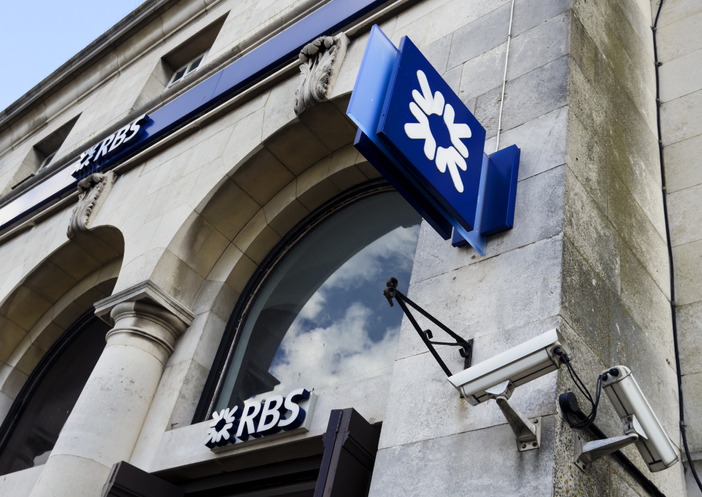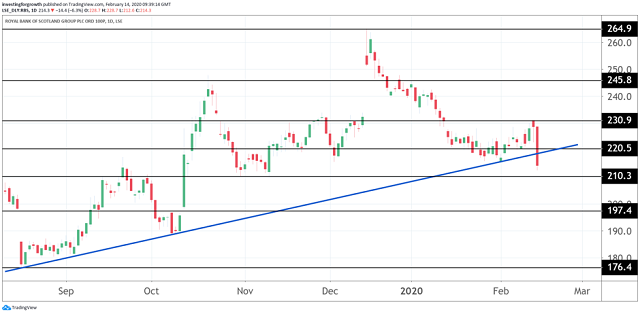Royal Bank of Scotland to become NatWest, but shares slump
RBS needs more than a name change to prop up the share price. Our head of markets reports.
14th February 2020 09:54
by Richard Hunter from interactive investor
RBS needs more than a name change to prop up the share price. Our head of markets reports.

The constant and necessary reinvention which has plagued The Royal Bank of Scotland (LSE:RBS) over the last decade shows no signs of abating as new chief executive Alison Rose takes the reins.
The newly proposed measures are far-reaching and range from the intangible – a transformation to a “purpose-led” bank and the re-emergence of the NatWest name for the group, 20 years after the hostile takeover by RBS – to the tangible, such as the large scaling down of the NatWest Markets business and a committed focus on cost reduction.
On a positive note, some of the heavy lifting has already been done. The disappointing third-quarter performance, which included an additional £900 million PPI provision, seems to have been an anomaly rather than a trend in the context of the year as a whole.
Full-year pre-tax profit surged by 26% and was above expectations, the cost/income ratio was reduced to 65% from a previous 71%, driven in part by cost reductions of £310 million, and both personal and mortgage lending showed healthy growth.

Source: TradingView Past performance is not a guide to future performance
The capital cushion remains at a robust 16.2% and the return on tangible equity figure was a comfortable 9.4%, with a targeted future range of 9 to 11%.
Meanwhile, the earnings per share metric also appreciated strongly, while the combined dividend and special dividend, although a lesser figure from the previous year, does not detract from a punchy current and projected yield of over 6%.
Equally, there are any number of metrics which require fairly immediate attention. The net interest margin and net interest income figures, down 5% and 7% respectively, are under immense pressure, with the historically low interest rate environment continuing to tighten the screw. Net impairment losses also jumped to £700 million, which is of some concern given a generally benign environment in the UK despite the government negotiations to come.
At the same time, the outlook comments from the bank were guarded, with particular pressure expected this year on income, which may mean another period of focus on cost control in order to maintain equilibrium. In the background, the government’s 62% stake in the business is a perennial overhang to the stock with no obvious light at the end of the tunnel.
- Barclays: CEO probe overshadows decent results
- Two bank shares for different risk appetites
- Lloyds and the UK bank sector: Full-year results preview
- Take control of your retirement planning with our award-winning, low-cost Self-Invested Personal Pension (SIPP)
The bank is clearly making some impressive progress in certain areas, not least the headline profit number, but under the bonnet there are nonetheless areas of concern. Equally, the former glories of the pre-financial crisis share price are a distant memory, and even over the last five years the shares have seen a 41% decline.
Most recently, the company has seen the benefit of the “Brexit bounce”, with the shares having risen 13% in the last six months, although over the last year the story is again one of underperformance, with a 6% decline comparing to a 3.5% increase in the wider FTSE 100 index.
Given the scale of the challenges ahead, the market consensus has reduced of late to a “hold”, reflecting that there may well be better value to be found elsewhere in the sector.
These articles are provided for information purposes only. Occasionally, an opinion about whether to buy or sell a specific investment may be provided by third parties. The content is not intended to be a personal recommendation to buy or sell any financial instrument or product, or to adopt any investment strategy as it is not provided based on an assessment of your investing knowledge and experience, your financial situation or your investment objectives. The value of your investments, and the income derived from them, may go down as well as up. You may not get back all the money that you invest. The investments referred to in this article may not be suitable for all investors, and if in doubt, an investor should seek advice from a qualified investment adviser.
Full performance can be found on the company or index summary page on the interactive investor website. Simply click on the company's or index name highlighted in the article.